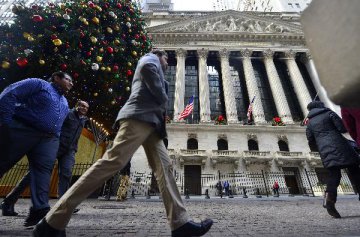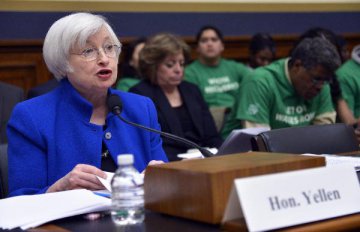
The United States Federal Reserve, in a monetary tightening cycle full of uncertainties, should be prudent with its monetary policy and be mindful of possible spillovers.
The Fed is expected to conclude a regular two-day monetary policy meeting Wednesday, with investors awaiting signals from the central bank of the world's biggest and most powerful economy. Although the benchmark interest rate is expected to be left unchanged, the markets will be watching over how the central bank of the world's largest economy intends to manage the pace of later rate hikes. Even if there is no interest hike at the upcoming Fed policy meeting, the Fed still has left the door open for future hikes.
The expectation of future rate hikes and the uncertainty over the prospect of future rate hikes alone could create much turbulence in the financial markets. More importantly, such volatility could be disastrous for weak economies. There have been signs of caution in the global market, such as reduced volume of trading and weak sentiments.
U.S. policymakers should see that their forecasts could arouse turbulence worldwide as the U.S. dollar is both a sovereign currency and an international reserve currency. An interest rate hike implies a reduction in the supply of dollar funds in the global market, and capital tends to flow to the United States.
For emerging economies, such capital outflows could put pressure on the exchange rate of their national currencies, creating severe risks if they are not well-prepared to counter this challenge. Typically, sufficient foreign currency reserves can be a strong safety belt.
Data from the Fed's two interest rate hikes in 1994 and 2004 showed that the net capital flows to the United States increased by 60 percent to 80 percent in the second year after the rates were raised. A report from the Washington-based Institute of International Finance predicted that the net capital outflows from emerging countries would continue at a moderate rate of 306 billion U.S. dollars in 2016, on the expectation of the subdued growth prospects for the emerging economies, as well as Fed's policy tightening.
For other economies, the silver lining is that an interest rate hike means a robust recovery of the U.S. economy, too. This is expected to improve the performance of other economies' export sectors.
The United States should be prudent with its monetary policies, which are globally significant given their spillover to other economies.
In addition to that, they should also be prudent with their monetary policies for a second reason -- there are not only spillovers but also spillbacks in an era of globalization.
Economies are interdependent on each other and influence each other, weak emerging markets will also hinder the recovery of advanced economies, including U.S. economy.
For the advanced economies like the United States, it is in their interest to avoid policies that benefit themselves at others' cost.
For emerging economies, establishing a sound and stable financial system, speeding up the adjustment of industrial structure to explore new industries and consumer markets as well as enhancing international policy coordination and cooperation will help them counter the challenges.






















Latest comments